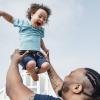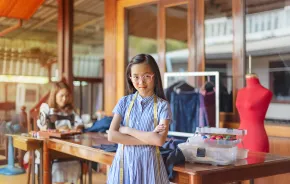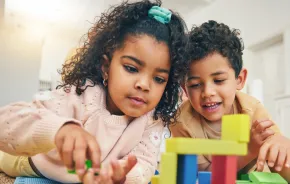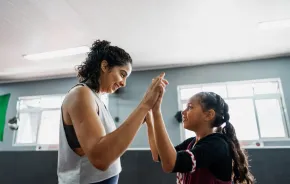
Ariane Gauvreau first worked with neurodiverse kids as a teenage ski instructor in Alaska. “I loved working at Kinder Ski: There was lots of hot chocolate and bathroom breaks,” says Gauvreau. But it wasn’t until she took a Psych 101 class as an undergrad at the University of Washington (UW) that she became specifically interested in autism.
Her interest grew as she received her bachelor’s and master’s degrees and eventually a doctorate — all at the UW. During those years, she worked at the UW’s inclusive early childhood center, the Experimental Education Unit (EEU).
“While the kids with special needs were pretty successful at the EEU, they struggled as they transitioned to public school. I wondered, ‘Why is it so hard to support neurodiversity in our public school system?’” says Gauvreau, who lives in Shoreline with her husband and 3-year-old son.
Now the field director and an instructor in special education at the UW, Gauvreau says her goal is to prepare special education teachers for their careers ahead. This means teaching them evidence-based practices and how to respond to each student’s specific cultural and learning needs. One tool: the UW’s Families as Mentors program.
Under Gauvreau’s leadership, the program has expanded from a requirement for only a select group of students to an important part of teacher education for all special education grad students. Each special education teacher in training meets one-on-one with a family with a child who has special needs. They meet five times over the course of a year, spending time in the family’s home and community.
“This program helps [the teachers in training] learn deeply from families by seeing their daily lives,” says Gauvreau. She recalls one student who partnered with a single parent raising a daughter with Down syndrome; the student told Gauvreau how surprised she was by everything the parent had to do to get her child ready for swim lessons, from adaptive equipment to behavioral support.
“Family life doesn’t exist within the walls of a school,” Gauvreau says. “This program gives our teaching candidates a slight glimpse into the daily successes and challenges of raising a child with special needs.
What does your job entail?
I get to work with many different school districts, agencies, teachers and administrators who are kind enough to welcome our graduate students into their classrooms as they learn to be teachers. Fieldwork and the real, hands-on opportunities to practice how to teach is a crucial aspect of teacher education.
I get to remain grounded in what’s going on in our state’s public school system, while teaching a handful of classes and staying up to date on all of the latest research on neurodiversity and best practices in special education.
What’s your favorite class to teach?
Right now, it’s a graduate class on autism. I’ve recently had the opportunity to learn more from autistic self-advocates themselves. This voice is really missing from many aspects of teacher education. It’s really stretched my thinking on how to prepare teachers to help kids with all aspects of their identity as a neurodiverse person.
Why do you think neurodiverse kids may struggle in general education classrooms?
I think all kids would do better if we promoted learning environments where all aspects of diversity are celebrated. That means seeing every student as a full member of a general education classroom and ensuring that talking about neurodiversity is a normal part of the conversation. What if we talked about the fact that a student has a disability called cerebral palsy and here’s what that means?
Teachers can add to understanding and inclusivity by reading books [that feature] neurodiverse characters and making it clear that everybody is working on and learning something different. Studies suggest that when we talk about neurodiversity with neurotypical children, these children are better peers, allies and friends to the neurodiverse children in the classroom.











